MGMT 6016 Corporate Sustainability
VerifiedAdded on 2022/01/27
|12
|3639
|32
AI Summary
The objective of this report is to provide a sustainability strategy proposal for Coles Supermarket Australia Pvt Ltd by evaluating the current sustainability policy of the company. An overview of the company will be given in this report along with an analysis of the current sustainability policies. The key sustainability issues raised in the current strategy will be discussed in this report. Lastly, a sustainability strategy proposal will be given for the management of Coles which can assist the corporation in maintaining a balance between the interests of its stakeholders.
Contribute Materials
Your contribution can guide someone’s learning journey. Share your
documents today.
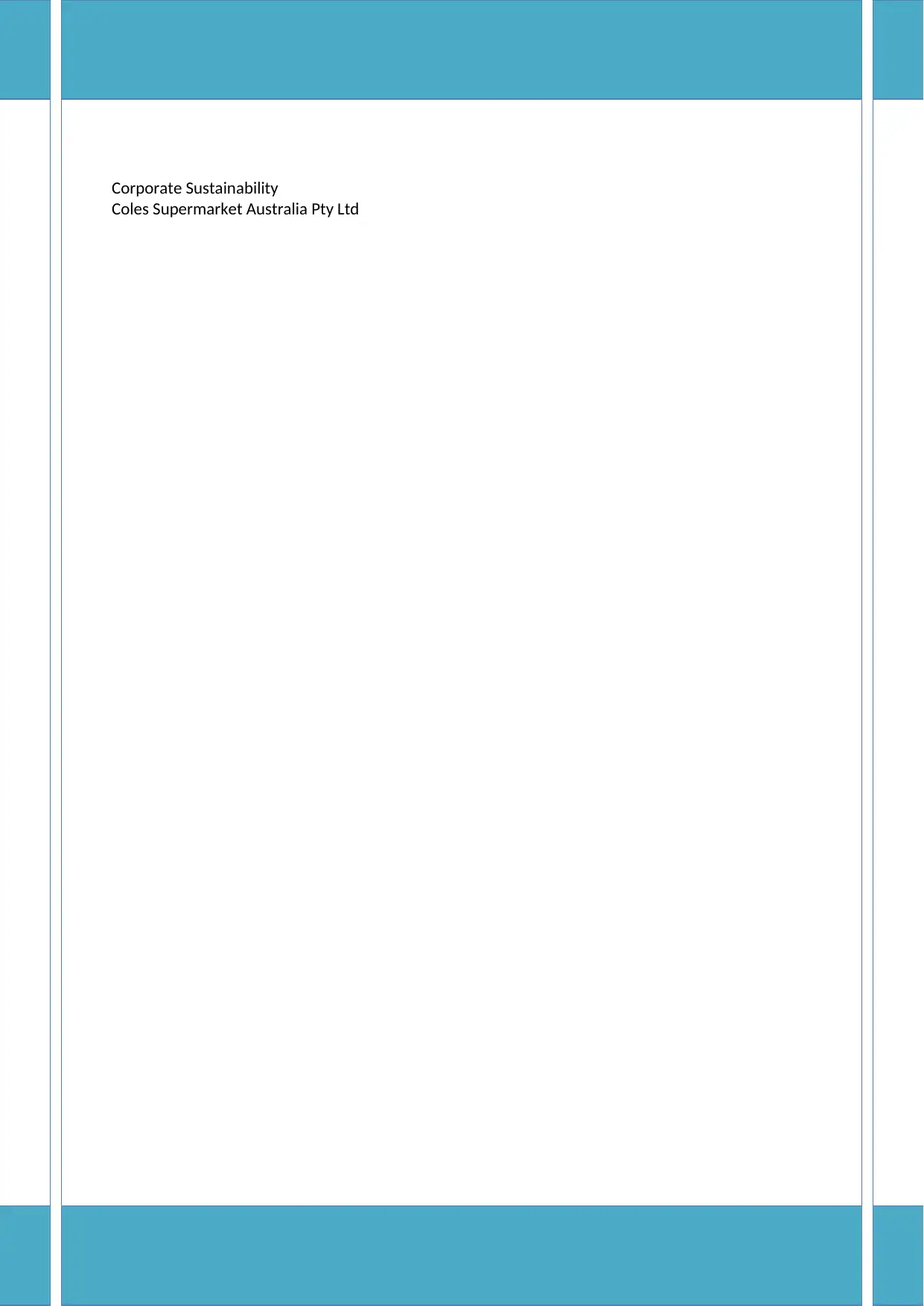
Corporate Sustainability
Coles Supermarket Australia Pty Ltd
Coles Supermarket Australia Pty Ltd
Secure Best Marks with AI Grader
Need help grading? Try our AI Grader for instant feedback on your assignments.
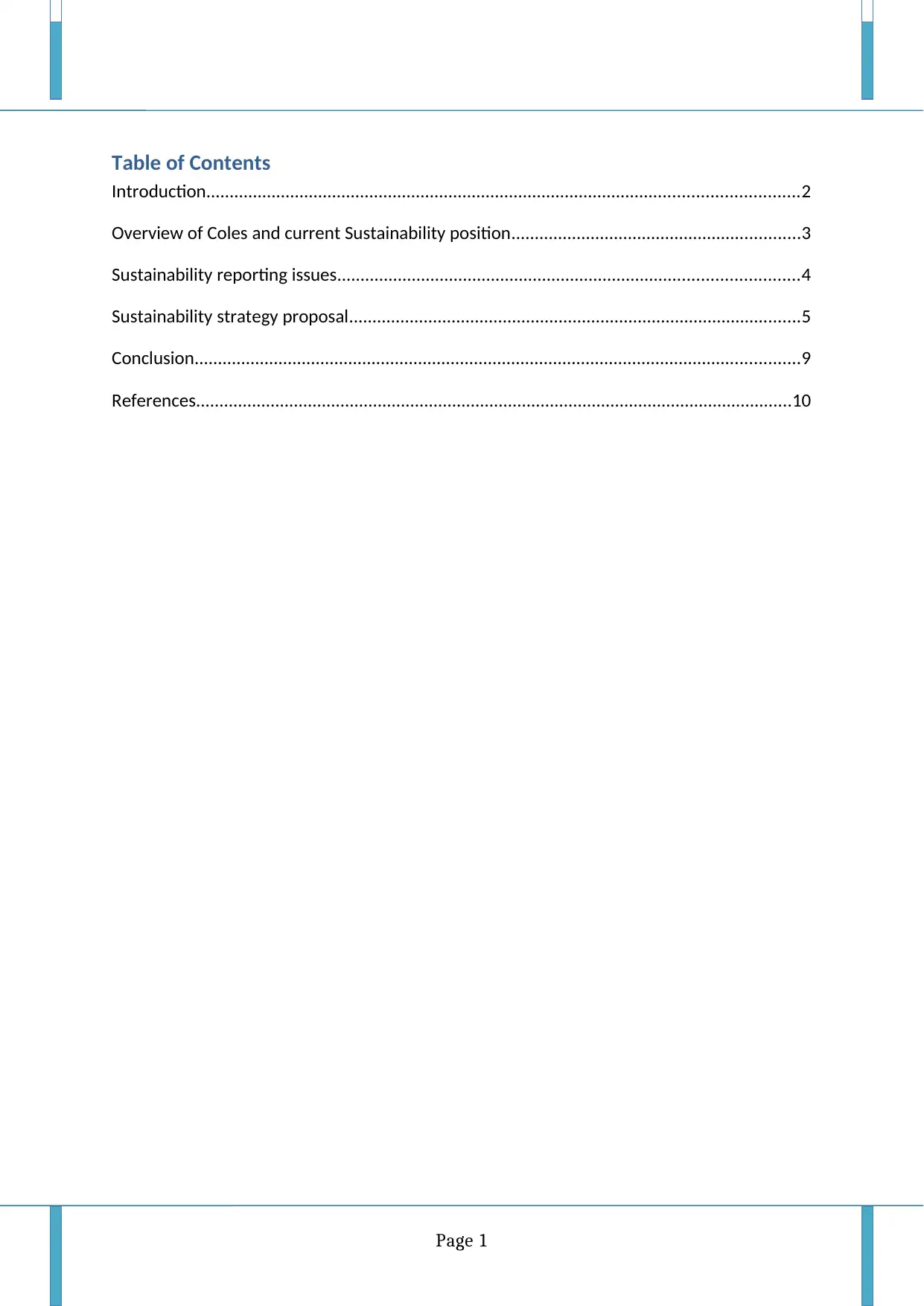
Table of Contents
Introduction...............................................................................................................................2
Overview of Coles and current Sustainability position..............................................................3
Sustainability reporting issues...................................................................................................4
Sustainability strategy proposal.................................................................................................5
Conclusion..................................................................................................................................9
References................................................................................................................................10
Page 1
Introduction...............................................................................................................................2
Overview of Coles and current Sustainability position..............................................................3
Sustainability reporting issues...................................................................................................4
Sustainability strategy proposal.................................................................................................5
Conclusion..................................................................................................................................9
References................................................................................................................................10
Page 1
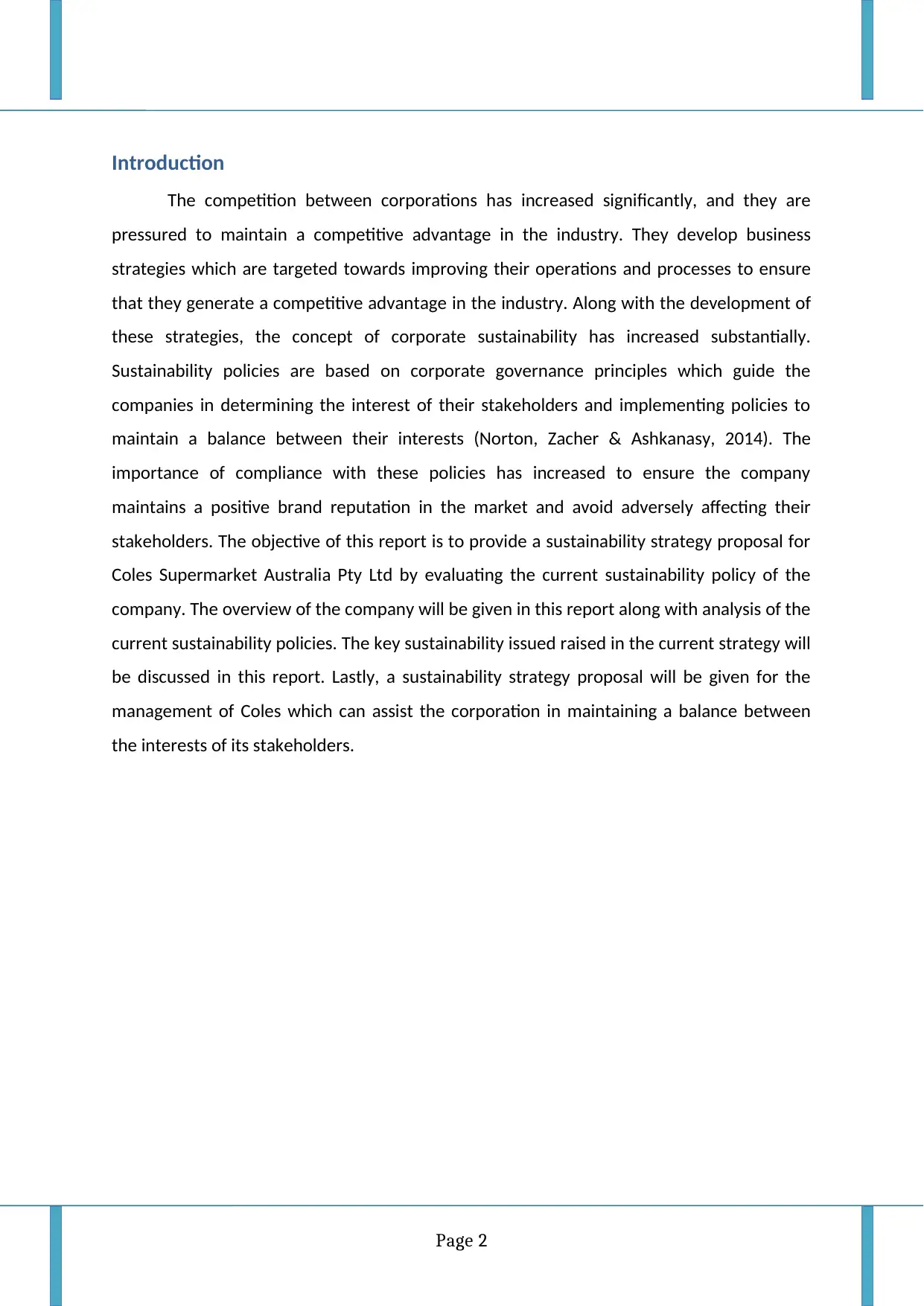
Introduction
The competition between corporations has increased significantly, and they are
pressured to maintain a competitive advantage in the industry. They develop business
strategies which are targeted towards improving their operations and processes to ensure
that they generate a competitive advantage in the industry. Along with the development of
these strategies, the concept of corporate sustainability has increased substantially.
Sustainability policies are based on corporate governance principles which guide the
companies in determining the interest of their stakeholders and implementing policies to
maintain a balance between their interests (Norton, Zacher & Ashkanasy, 2014). The
importance of compliance with these policies has increased to ensure the company
maintains a positive brand reputation in the market and avoid adversely affecting their
stakeholders. The objective of this report is to provide a sustainability strategy proposal for
Coles Supermarket Australia Pty Ltd by evaluating the current sustainability policy of the
company. The overview of the company will be given in this report along with analysis of the
current sustainability policies. The key sustainability issued raised in the current strategy will
be discussed in this report. Lastly, a sustainability strategy proposal will be given for the
management of Coles which can assist the corporation in maintaining a balance between
the interests of its stakeholders.
Page 2
The competition between corporations has increased significantly, and they are
pressured to maintain a competitive advantage in the industry. They develop business
strategies which are targeted towards improving their operations and processes to ensure
that they generate a competitive advantage in the industry. Along with the development of
these strategies, the concept of corporate sustainability has increased substantially.
Sustainability policies are based on corporate governance principles which guide the
companies in determining the interest of their stakeholders and implementing policies to
maintain a balance between their interests (Norton, Zacher & Ashkanasy, 2014). The
importance of compliance with these policies has increased to ensure the company
maintains a positive brand reputation in the market and avoid adversely affecting their
stakeholders. The objective of this report is to provide a sustainability strategy proposal for
Coles Supermarket Australia Pty Ltd by evaluating the current sustainability policy of the
company. The overview of the company will be given in this report along with analysis of the
current sustainability policies. The key sustainability issued raised in the current strategy will
be discussed in this report. Lastly, a sustainability strategy proposal will be given for the
management of Coles which can assist the corporation in maintaining a balance between
the interests of its stakeholders.
Page 2
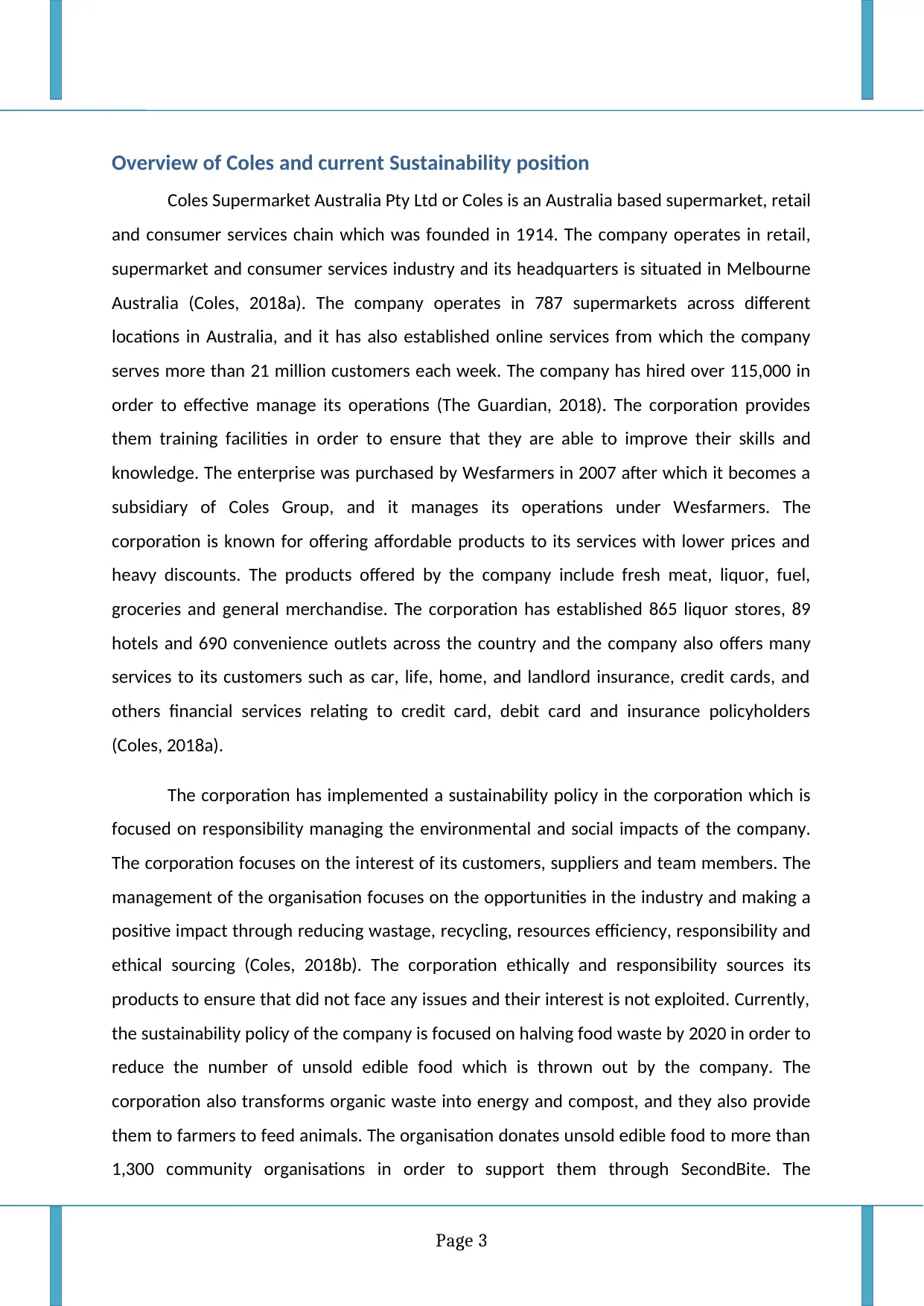
Overview of Coles and current Sustainability position
Coles Supermarket Australia Pty Ltd or Coles is an Australia based supermarket, retail
and consumer services chain which was founded in 1914. The company operates in retail,
supermarket and consumer services industry and its headquarters is situated in Melbourne
Australia (Coles, 2018a). The company operates in 787 supermarkets across different
locations in Australia, and it has also established online services from which the company
serves more than 21 million customers each week. The company has hired over 115,000 in
order to effective manage its operations (The Guardian, 2018). The corporation provides
them training facilities in order to ensure that they are able to improve their skills and
knowledge. The enterprise was purchased by Wesfarmers in 2007 after which it becomes a
subsidiary of Coles Group, and it manages its operations under Wesfarmers. The
corporation is known for offering affordable products to its services with lower prices and
heavy discounts. The products offered by the company include fresh meat, liquor, fuel,
groceries and general merchandise. The corporation has established 865 liquor stores, 89
hotels and 690 convenience outlets across the country and the company also offers many
services to its customers such as car, life, home, and landlord insurance, credit cards, and
others financial services relating to credit card, debit card and insurance policyholders
(Coles, 2018a).
The corporation has implemented a sustainability policy in the corporation which is
focused on responsibility managing the environmental and social impacts of the company.
The corporation focuses on the interest of its customers, suppliers and team members. The
management of the organisation focuses on the opportunities in the industry and making a
positive impact through reducing wastage, recycling, resources efficiency, responsibility and
ethical sourcing (Coles, 2018b). The corporation ethically and responsibility sources its
products to ensure that did not face any issues and their interest is not exploited. Currently,
the sustainability policy of the company is focused on halving food waste by 2020 in order to
reduce the number of unsold edible food which is thrown out by the company. The
corporation also transforms organic waste into energy and compost, and they also provide
them to farmers to feed animals. The organisation donates unsold edible food to more than
1,300 community organisations in order to support them through SecondBite. The
Page 3
Coles Supermarket Australia Pty Ltd or Coles is an Australia based supermarket, retail
and consumer services chain which was founded in 1914. The company operates in retail,
supermarket and consumer services industry and its headquarters is situated in Melbourne
Australia (Coles, 2018a). The company operates in 787 supermarkets across different
locations in Australia, and it has also established online services from which the company
serves more than 21 million customers each week. The company has hired over 115,000 in
order to effective manage its operations (The Guardian, 2018). The corporation provides
them training facilities in order to ensure that they are able to improve their skills and
knowledge. The enterprise was purchased by Wesfarmers in 2007 after which it becomes a
subsidiary of Coles Group, and it manages its operations under Wesfarmers. The
corporation is known for offering affordable products to its services with lower prices and
heavy discounts. The products offered by the company include fresh meat, liquor, fuel,
groceries and general merchandise. The corporation has established 865 liquor stores, 89
hotels and 690 convenience outlets across the country and the company also offers many
services to its customers such as car, life, home, and landlord insurance, credit cards, and
others financial services relating to credit card, debit card and insurance policyholders
(Coles, 2018a).
The corporation has implemented a sustainability policy in the corporation which is
focused on responsibility managing the environmental and social impacts of the company.
The corporation focuses on the interest of its customers, suppliers and team members. The
management of the organisation focuses on the opportunities in the industry and making a
positive impact through reducing wastage, recycling, resources efficiency, responsibility and
ethical sourcing (Coles, 2018b). The corporation ethically and responsibility sources its
products to ensure that did not face any issues and their interest is not exploited. Currently,
the sustainability policy of the company is focused on halving food waste by 2020 in order to
reduce the number of unsold edible food which is thrown out by the company. The
corporation also transforms organic waste into energy and compost, and they also provide
them to farmers to feed animals. The organisation donates unsold edible food to more than
1,300 community organisations in order to support them through SecondBite. The
Page 3
Secure Best Marks with AI Grader
Need help grading? Try our AI Grader for instant feedback on your assignments.
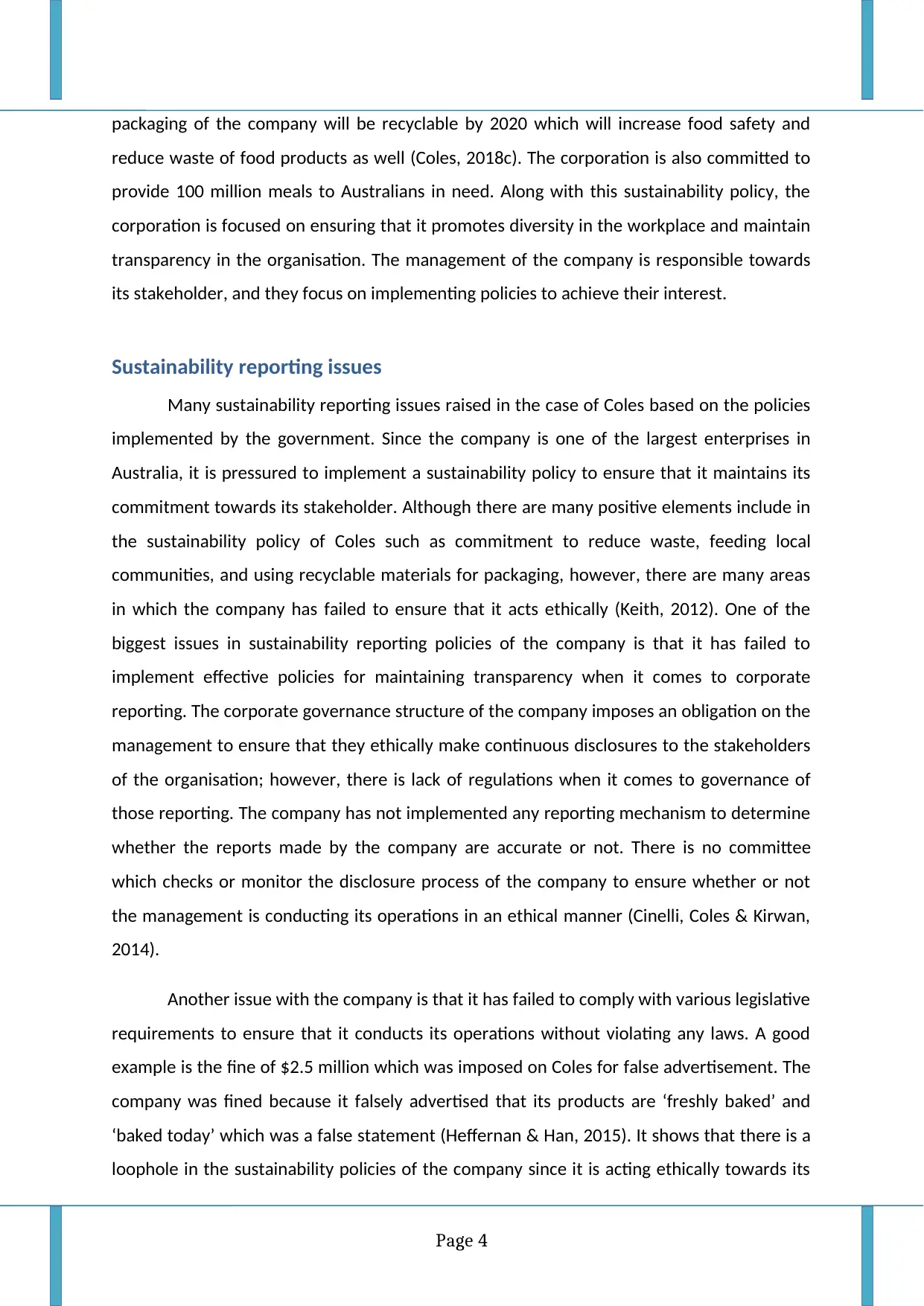
packaging of the company will be recyclable by 2020 which will increase food safety and
reduce waste of food products as well (Coles, 2018c). The corporation is also committed to
provide 100 million meals to Australians in need. Along with this sustainability policy, the
corporation is focused on ensuring that it promotes diversity in the workplace and maintain
transparency in the organisation. The management of the company is responsible towards
its stakeholder, and they focus on implementing policies to achieve their interest.
Sustainability reporting issues
Many sustainability reporting issues raised in the case of Coles based on the policies
implemented by the government. Since the company is one of the largest enterprises in
Australia, it is pressured to implement a sustainability policy to ensure that it maintains its
commitment towards its stakeholder. Although there are many positive elements include in
the sustainability policy of Coles such as commitment to reduce waste, feeding local
communities, and using recyclable materials for packaging, however, there are many areas
in which the company has failed to ensure that it acts ethically (Keith, 2012). One of the
biggest issues in sustainability reporting policies of the company is that it has failed to
implement effective policies for maintaining transparency when it comes to corporate
reporting. The corporate governance structure of the company imposes an obligation on the
management to ensure that they ethically make continuous disclosures to the stakeholders
of the organisation; however, there is lack of regulations when it comes to governance of
those reporting. The company has not implemented any reporting mechanism to determine
whether the reports made by the company are accurate or not. There is no committee
which checks or monitor the disclosure process of the company to ensure whether or not
the management is conducting its operations in an ethical manner (Cinelli, Coles & Kirwan,
2014).
Another issue with the company is that it has failed to comply with various legislative
requirements to ensure that it conducts its operations without violating any laws. A good
example is the fine of $2.5 million which was imposed on Coles for false advertisement. The
company was fined because it falsely advertised that its products are ‘freshly baked’ and
‘baked today’ which was a false statement (Heffernan & Han, 2015). It shows that there is a
loophole in the sustainability policies of the company since it is acting ethically towards its
Page 4
reduce waste of food products as well (Coles, 2018c). The corporation is also committed to
provide 100 million meals to Australians in need. Along with this sustainability policy, the
corporation is focused on ensuring that it promotes diversity in the workplace and maintain
transparency in the organisation. The management of the company is responsible towards
its stakeholder, and they focus on implementing policies to achieve their interest.
Sustainability reporting issues
Many sustainability reporting issues raised in the case of Coles based on the policies
implemented by the government. Since the company is one of the largest enterprises in
Australia, it is pressured to implement a sustainability policy to ensure that it maintains its
commitment towards its stakeholder. Although there are many positive elements include in
the sustainability policy of Coles such as commitment to reduce waste, feeding local
communities, and using recyclable materials for packaging, however, there are many areas
in which the company has failed to ensure that it acts ethically (Keith, 2012). One of the
biggest issues in sustainability reporting policies of the company is that it has failed to
implement effective policies for maintaining transparency when it comes to corporate
reporting. The corporate governance structure of the company imposes an obligation on the
management to ensure that they ethically make continuous disclosures to the stakeholders
of the organisation; however, there is lack of regulations when it comes to governance of
those reporting. The company has not implemented any reporting mechanism to determine
whether the reports made by the company are accurate or not. There is no committee
which checks or monitor the disclosure process of the company to ensure whether or not
the management is conducting its operations in an ethical manner (Cinelli, Coles & Kirwan,
2014).
Another issue with the company is that it has failed to comply with various legislative
requirements to ensure that it conducts its operations without violating any laws. A good
example is the fine of $2.5 million which was imposed on Coles for false advertisement. The
company was fined because it falsely advertised that its products are ‘freshly baked’ and
‘baked today’ which was a false statement (Heffernan & Han, 2015). It shows that there is a
loophole in the sustainability policies of the company since it is acting ethically towards its
Page 4
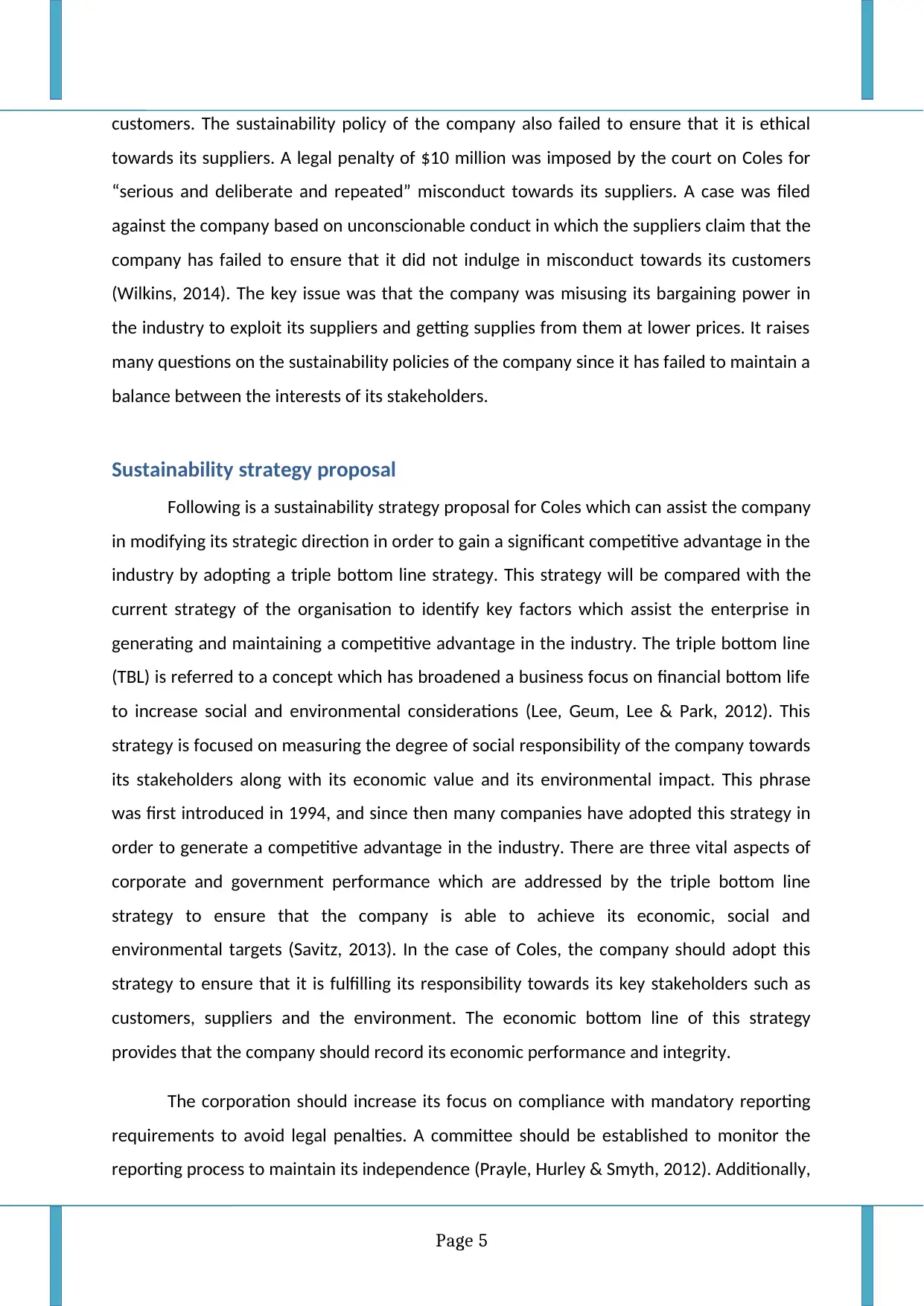
customers. The sustainability policy of the company also failed to ensure that it is ethical
towards its suppliers. A legal penalty of $10 million was imposed by the court on Coles for
“serious and deliberate and repeated” misconduct towards its suppliers. A case was filed
against the company based on unconscionable conduct in which the suppliers claim that the
company has failed to ensure that it did not indulge in misconduct towards its customers
(Wilkins, 2014). The key issue was that the company was misusing its bargaining power in
the industry to exploit its suppliers and getting supplies from them at lower prices. It raises
many questions on the sustainability policies of the company since it has failed to maintain a
balance between the interests of its stakeholders.
Sustainability strategy proposal
Following is a sustainability strategy proposal for Coles which can assist the company
in modifying its strategic direction in order to gain a significant competitive advantage in the
industry by adopting a triple bottom line strategy. This strategy will be compared with the
current strategy of the organisation to identify key factors which assist the enterprise in
generating and maintaining a competitive advantage in the industry. The triple bottom line
(TBL) is referred to a concept which has broadened a business focus on financial bottom life
to increase social and environmental considerations (Lee, Geum, Lee & Park, 2012). This
strategy is focused on measuring the degree of social responsibility of the company towards
its stakeholders along with its economic value and its environmental impact. This phrase
was first introduced in 1994, and since then many companies have adopted this strategy in
order to generate a competitive advantage in the industry. There are three vital aspects of
corporate and government performance which are addressed by the triple bottom line
strategy to ensure that the company is able to achieve its economic, social and
environmental targets (Savitz, 2013). In the case of Coles, the company should adopt this
strategy to ensure that it is fulfilling its responsibility towards its key stakeholders such as
customers, suppliers and the environment. The economic bottom line of this strategy
provides that the company should record its economic performance and integrity.
The corporation should increase its focus on compliance with mandatory reporting
requirements to avoid legal penalties. A committee should be established to monitor the
reporting process to maintain its independence (Prayle, Hurley & Smyth, 2012). Additionally,
Page 5
towards its suppliers. A legal penalty of $10 million was imposed by the court on Coles for
“serious and deliberate and repeated” misconduct towards its suppliers. A case was filed
against the company based on unconscionable conduct in which the suppliers claim that the
company has failed to ensure that it did not indulge in misconduct towards its customers
(Wilkins, 2014). The key issue was that the company was misusing its bargaining power in
the industry to exploit its suppliers and getting supplies from them at lower prices. It raises
many questions on the sustainability policies of the company since it has failed to maintain a
balance between the interests of its stakeholders.
Sustainability strategy proposal
Following is a sustainability strategy proposal for Coles which can assist the company
in modifying its strategic direction in order to gain a significant competitive advantage in the
industry by adopting a triple bottom line strategy. This strategy will be compared with the
current strategy of the organisation to identify key factors which assist the enterprise in
generating and maintaining a competitive advantage in the industry. The triple bottom line
(TBL) is referred to a concept which has broadened a business focus on financial bottom life
to increase social and environmental considerations (Lee, Geum, Lee & Park, 2012). This
strategy is focused on measuring the degree of social responsibility of the company towards
its stakeholders along with its economic value and its environmental impact. This phrase
was first introduced in 1994, and since then many companies have adopted this strategy in
order to generate a competitive advantage in the industry. There are three vital aspects of
corporate and government performance which are addressed by the triple bottom line
strategy to ensure that the company is able to achieve its economic, social and
environmental targets (Savitz, 2013). In the case of Coles, the company should adopt this
strategy to ensure that it is fulfilling its responsibility towards its key stakeholders such as
customers, suppliers and the environment. The economic bottom line of this strategy
provides that the company should record its economic performance and integrity.
The corporation should increase its focus on compliance with mandatory reporting
requirements to avoid legal penalties. A committee should be established to monitor the
reporting process to maintain its independence (Prayle, Hurley & Smyth, 2012). Additionally,
Page 5
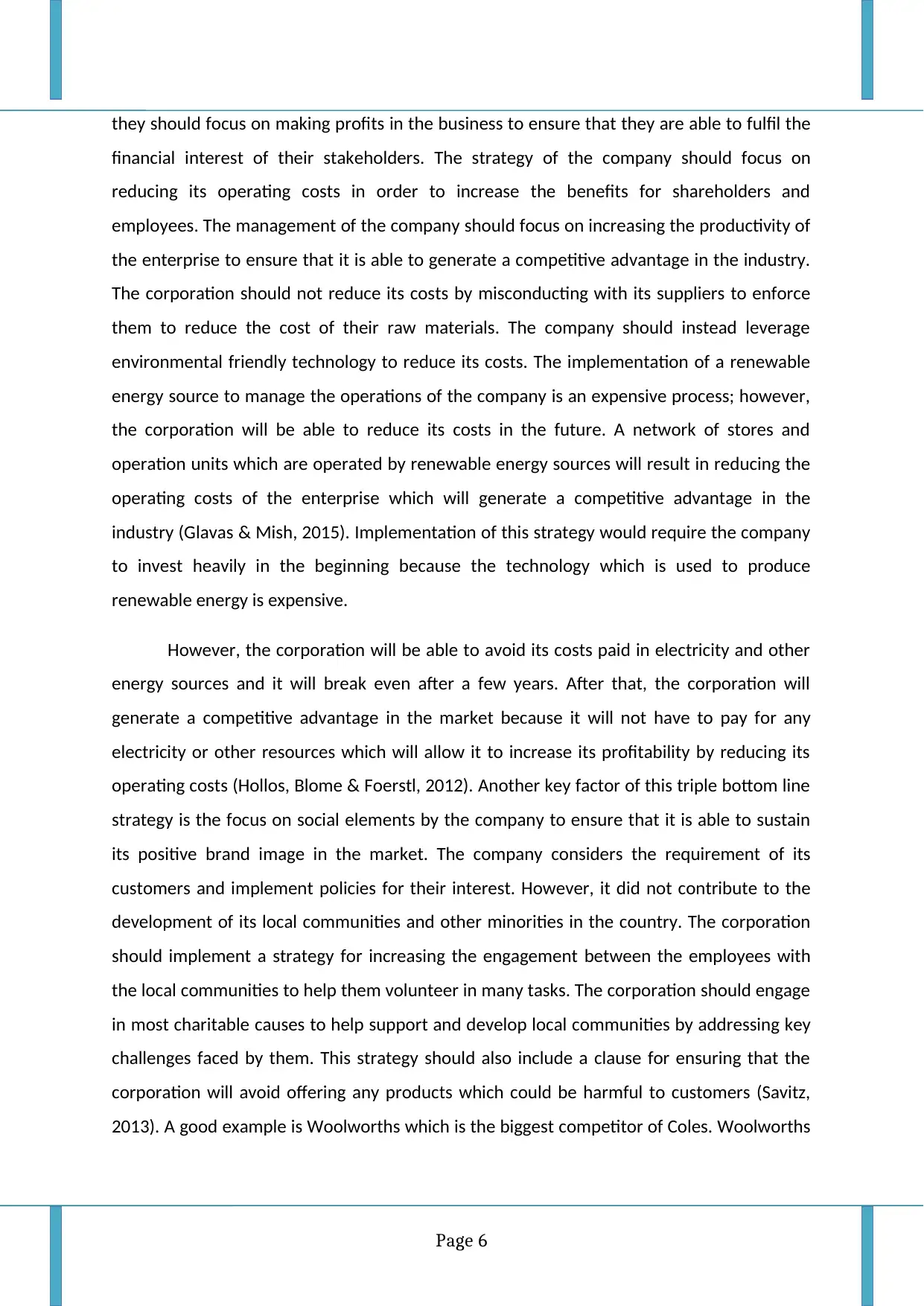
they should focus on making profits in the business to ensure that they are able to fulfil the
financial interest of their stakeholders. The strategy of the company should focus on
reducing its operating costs in order to increase the benefits for shareholders and
employees. The management of the company should focus on increasing the productivity of
the enterprise to ensure that it is able to generate a competitive advantage in the industry.
The corporation should not reduce its costs by misconducting with its suppliers to enforce
them to reduce the cost of their raw materials. The company should instead leverage
environmental friendly technology to reduce its costs. The implementation of a renewable
energy source to manage the operations of the company is an expensive process; however,
the corporation will be able to reduce its costs in the future. A network of stores and
operation units which are operated by renewable energy sources will result in reducing the
operating costs of the enterprise which will generate a competitive advantage in the
industry (Glavas & Mish, 2015). Implementation of this strategy would require the company
to invest heavily in the beginning because the technology which is used to produce
renewable energy is expensive.
However, the corporation will be able to avoid its costs paid in electricity and other
energy sources and it will break even after a few years. After that, the corporation will
generate a competitive advantage in the market because it will not have to pay for any
electricity or other resources which will allow it to increase its profitability by reducing its
operating costs (Hollos, Blome & Foerstl, 2012). Another key factor of this triple bottom line
strategy is the focus on social elements by the company to ensure that it is able to sustain
its positive brand image in the market. The company considers the requirement of its
customers and implement policies for their interest. However, it did not contribute to the
development of its local communities and other minorities in the country. The corporation
should implement a strategy for increasing the engagement between the employees with
the local communities to help them volunteer in many tasks. The corporation should engage
in most charitable causes to help support and develop local communities by addressing key
challenges faced by them. This strategy should also include a clause for ensuring that the
corporation will avoid offering any products which could be harmful to customers (Savitz,
2013). A good example is Woolworths which is the biggest competitor of Coles. Woolworths
Page 6
financial interest of their stakeholders. The strategy of the company should focus on
reducing its operating costs in order to increase the benefits for shareholders and
employees. The management of the company should focus on increasing the productivity of
the enterprise to ensure that it is able to generate a competitive advantage in the industry.
The corporation should not reduce its costs by misconducting with its suppliers to enforce
them to reduce the cost of their raw materials. The company should instead leverage
environmental friendly technology to reduce its costs. The implementation of a renewable
energy source to manage the operations of the company is an expensive process; however,
the corporation will be able to reduce its costs in the future. A network of stores and
operation units which are operated by renewable energy sources will result in reducing the
operating costs of the enterprise which will generate a competitive advantage in the
industry (Glavas & Mish, 2015). Implementation of this strategy would require the company
to invest heavily in the beginning because the technology which is used to produce
renewable energy is expensive.
However, the corporation will be able to avoid its costs paid in electricity and other
energy sources and it will break even after a few years. After that, the corporation will
generate a competitive advantage in the market because it will not have to pay for any
electricity or other resources which will allow it to increase its profitability by reducing its
operating costs (Hollos, Blome & Foerstl, 2012). Another key factor of this triple bottom line
strategy is the focus on social elements by the company to ensure that it is able to sustain
its positive brand image in the market. The company considers the requirement of its
customers and implement policies for their interest. However, it did not contribute to the
development of its local communities and other minorities in the country. The corporation
should implement a strategy for increasing the engagement between the employees with
the local communities to help them volunteer in many tasks. The corporation should engage
in most charitable causes to help support and develop local communities by addressing key
challenges faced by them. This strategy should also include a clause for ensuring that the
corporation will avoid offering any products which could be harmful to customers (Savitz,
2013). A good example is Woolworths which is the biggest competitor of Coles. Woolworths
Page 6
Paraphrase This Document
Need a fresh take? Get an instant paraphrase of this document with our AI Paraphraser
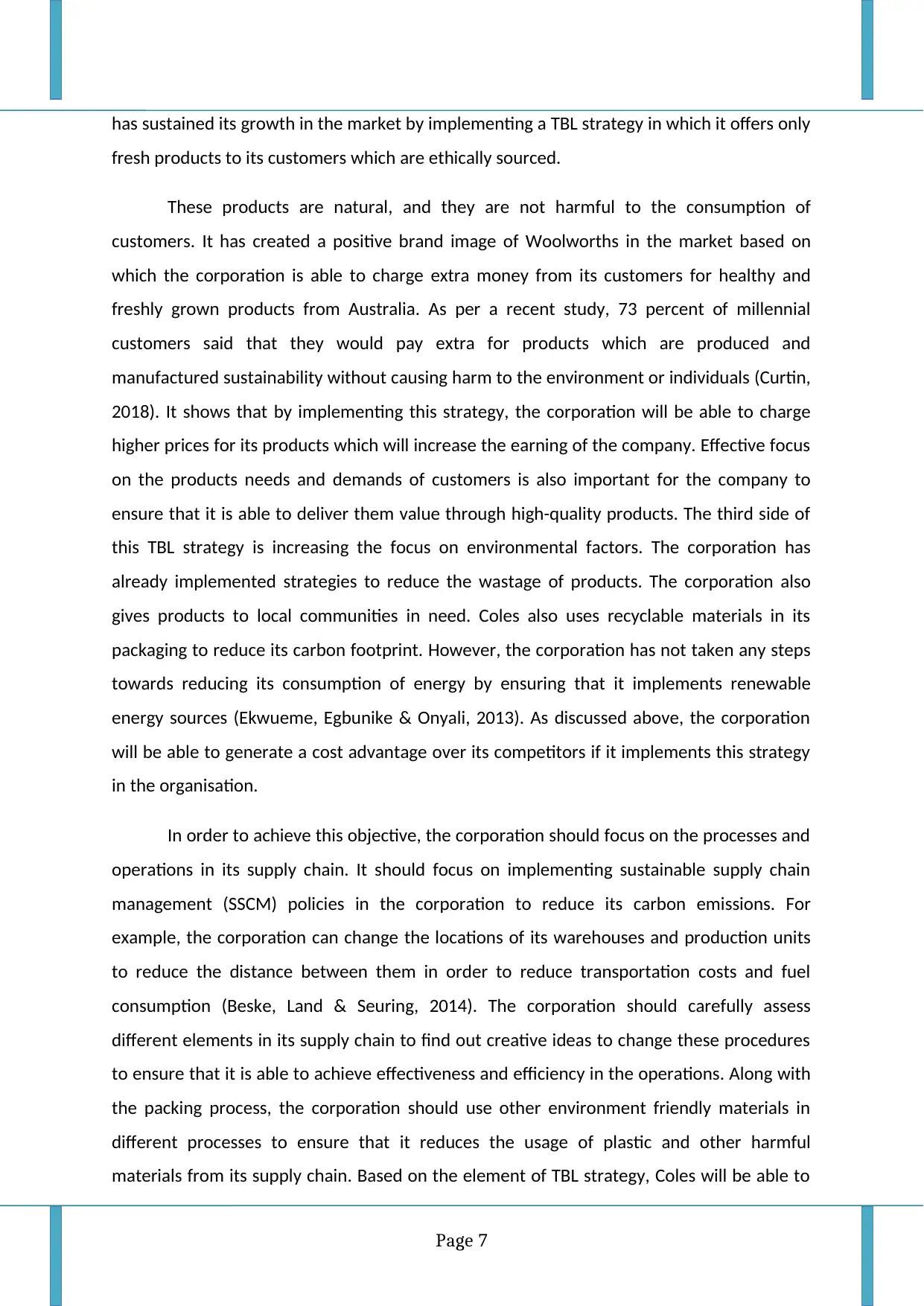
has sustained its growth in the market by implementing a TBL strategy in which it offers only
fresh products to its customers which are ethically sourced.
These products are natural, and they are not harmful to the consumption of
customers. It has created a positive brand image of Woolworths in the market based on
which the corporation is able to charge extra money from its customers for healthy and
freshly grown products from Australia. As per a recent study, 73 percent of millennial
customers said that they would pay extra for products which are produced and
manufactured sustainability without causing harm to the environment or individuals (Curtin,
2018). It shows that by implementing this strategy, the corporation will be able to charge
higher prices for its products which will increase the earning of the company. Effective focus
on the products needs and demands of customers is also important for the company to
ensure that it is able to deliver them value through high-quality products. The third side of
this TBL strategy is increasing the focus on environmental factors. The corporation has
already implemented strategies to reduce the wastage of products. The corporation also
gives products to local communities in need. Coles also uses recyclable materials in its
packaging to reduce its carbon footprint. However, the corporation has not taken any steps
towards reducing its consumption of energy by ensuring that it implements renewable
energy sources (Ekwueme, Egbunike & Onyali, 2013). As discussed above, the corporation
will be able to generate a cost advantage over its competitors if it implements this strategy
in the organisation.
In order to achieve this objective, the corporation should focus on the processes and
operations in its supply chain. It should focus on implementing sustainable supply chain
management (SSCM) policies in the corporation to reduce its carbon emissions. For
example, the corporation can change the locations of its warehouses and production units
to reduce the distance between them in order to reduce transportation costs and fuel
consumption (Beske, Land & Seuring, 2014). The corporation should carefully assess
different elements in its supply chain to find out creative ideas to change these procedures
to ensure that it is able to achieve effectiveness and efficiency in the operations. Along with
the packing process, the corporation should use other environment friendly materials in
different processes to ensure that it reduces the usage of plastic and other harmful
materials from its supply chain. Based on the element of TBL strategy, Coles will be able to
Page 7
fresh products to its customers which are ethically sourced.
These products are natural, and they are not harmful to the consumption of
customers. It has created a positive brand image of Woolworths in the market based on
which the corporation is able to charge extra money from its customers for healthy and
freshly grown products from Australia. As per a recent study, 73 percent of millennial
customers said that they would pay extra for products which are produced and
manufactured sustainability without causing harm to the environment or individuals (Curtin,
2018). It shows that by implementing this strategy, the corporation will be able to charge
higher prices for its products which will increase the earning of the company. Effective focus
on the products needs and demands of customers is also important for the company to
ensure that it is able to deliver them value through high-quality products. The third side of
this TBL strategy is increasing the focus on environmental factors. The corporation has
already implemented strategies to reduce the wastage of products. The corporation also
gives products to local communities in need. Coles also uses recyclable materials in its
packaging to reduce its carbon footprint. However, the corporation has not taken any steps
towards reducing its consumption of energy by ensuring that it implements renewable
energy sources (Ekwueme, Egbunike & Onyali, 2013). As discussed above, the corporation
will be able to generate a cost advantage over its competitors if it implements this strategy
in the organisation.
In order to achieve this objective, the corporation should focus on the processes and
operations in its supply chain. It should focus on implementing sustainable supply chain
management (SSCM) policies in the corporation to reduce its carbon emissions. For
example, the corporation can change the locations of its warehouses and production units
to reduce the distance between them in order to reduce transportation costs and fuel
consumption (Beske, Land & Seuring, 2014). The corporation should carefully assess
different elements in its supply chain to find out creative ideas to change these procedures
to ensure that it is able to achieve effectiveness and efficiency in the operations. Along with
the packing process, the corporation should use other environment friendly materials in
different processes to ensure that it reduces the usage of plastic and other harmful
materials from its supply chain. Based on the element of TBL strategy, Coles will be able to
Page 7
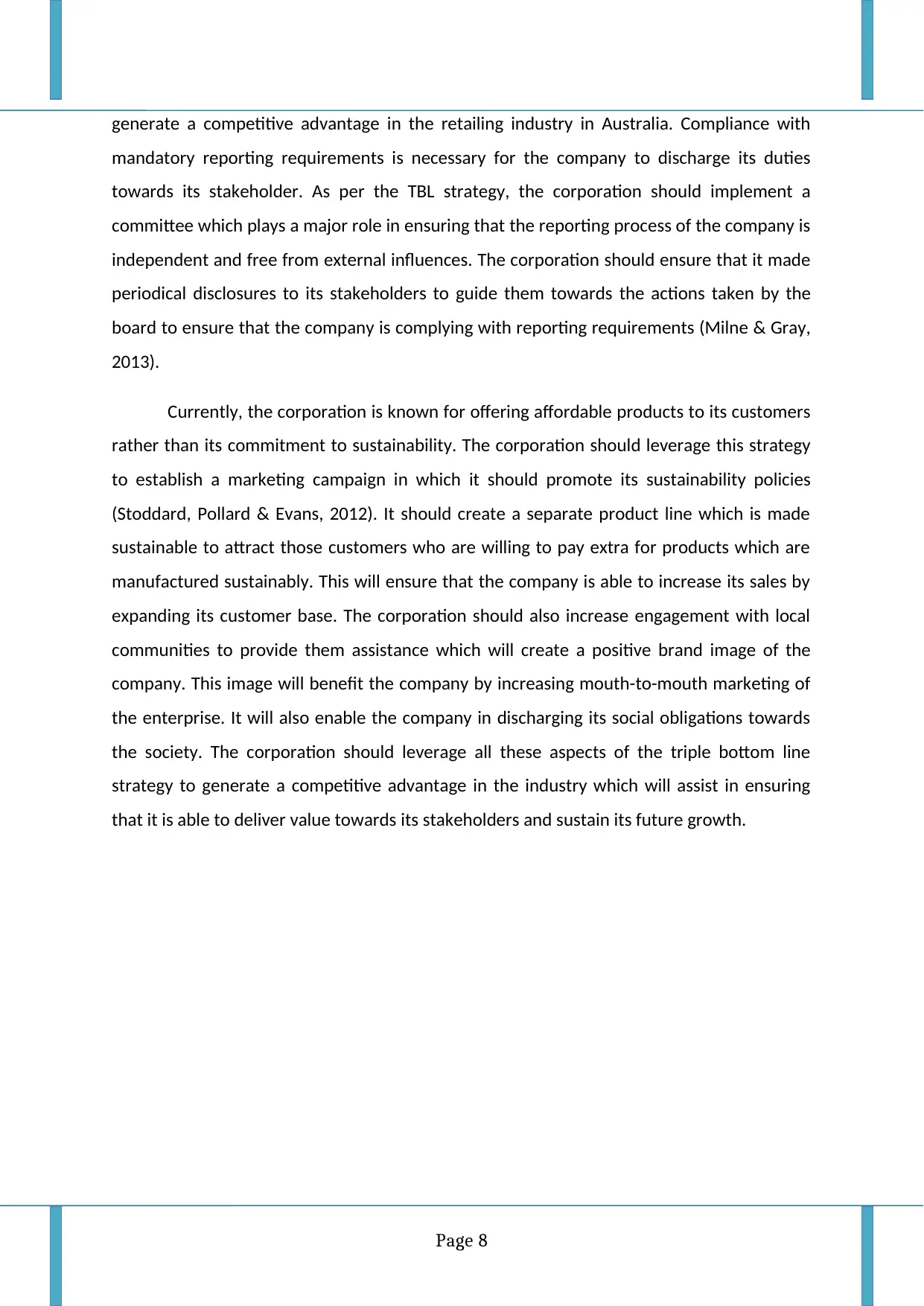
generate a competitive advantage in the retailing industry in Australia. Compliance with
mandatory reporting requirements is necessary for the company to discharge its duties
towards its stakeholder. As per the TBL strategy, the corporation should implement a
committee which plays a major role in ensuring that the reporting process of the company is
independent and free from external influences. The corporation should ensure that it made
periodical disclosures to its stakeholders to guide them towards the actions taken by the
board to ensure that the company is complying with reporting requirements (Milne & Gray,
2013).
Currently, the corporation is known for offering affordable products to its customers
rather than its commitment to sustainability. The corporation should leverage this strategy
to establish a marketing campaign in which it should promote its sustainability policies
(Stoddard, Pollard & Evans, 2012). It should create a separate product line which is made
sustainable to attract those customers who are willing to pay extra for products which are
manufactured sustainably. This will ensure that the company is able to increase its sales by
expanding its customer base. The corporation should also increase engagement with local
communities to provide them assistance which will create a positive brand image of the
company. This image will benefit the company by increasing mouth-to-mouth marketing of
the enterprise. It will also enable the company in discharging its social obligations towards
the society. The corporation should leverage all these aspects of the triple bottom line
strategy to generate a competitive advantage in the industry which will assist in ensuring
that it is able to deliver value towards its stakeholders and sustain its future growth.
Page 8
mandatory reporting requirements is necessary for the company to discharge its duties
towards its stakeholder. As per the TBL strategy, the corporation should implement a
committee which plays a major role in ensuring that the reporting process of the company is
independent and free from external influences. The corporation should ensure that it made
periodical disclosures to its stakeholders to guide them towards the actions taken by the
board to ensure that the company is complying with reporting requirements (Milne & Gray,
2013).
Currently, the corporation is known for offering affordable products to its customers
rather than its commitment to sustainability. The corporation should leverage this strategy
to establish a marketing campaign in which it should promote its sustainability policies
(Stoddard, Pollard & Evans, 2012). It should create a separate product line which is made
sustainable to attract those customers who are willing to pay extra for products which are
manufactured sustainably. This will ensure that the company is able to increase its sales by
expanding its customer base. The corporation should also increase engagement with local
communities to provide them assistance which will create a positive brand image of the
company. This image will benefit the company by increasing mouth-to-mouth marketing of
the enterprise. It will also enable the company in discharging its social obligations towards
the society. The corporation should leverage all these aspects of the triple bottom line
strategy to generate a competitive advantage in the industry which will assist in ensuring
that it is able to deliver value towards its stakeholders and sustain its future growth.
Page 8
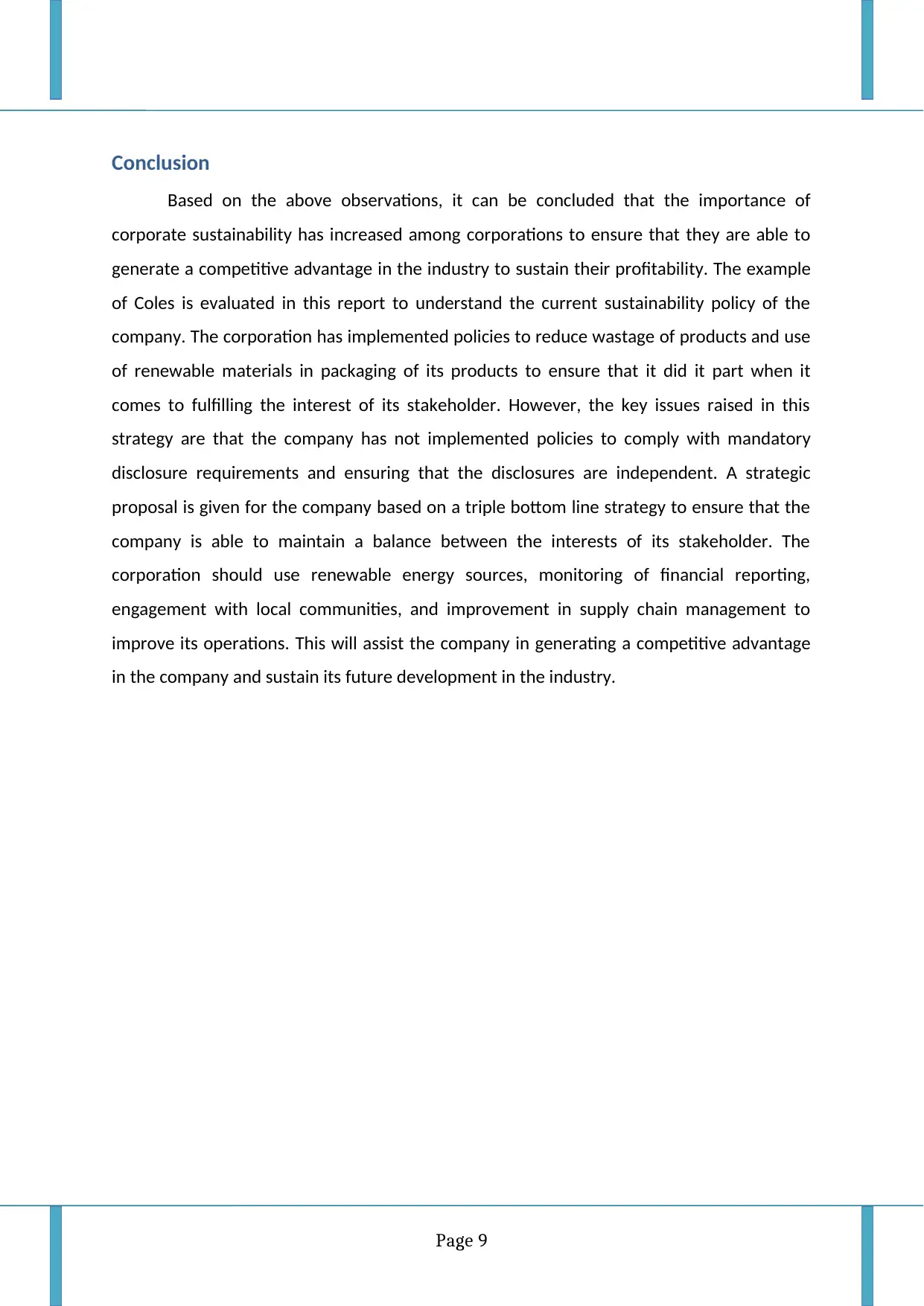
Conclusion
Based on the above observations, it can be concluded that the importance of
corporate sustainability has increased among corporations to ensure that they are able to
generate a competitive advantage in the industry to sustain their profitability. The example
of Coles is evaluated in this report to understand the current sustainability policy of the
company. The corporation has implemented policies to reduce wastage of products and use
of renewable materials in packaging of its products to ensure that it did it part when it
comes to fulfilling the interest of its stakeholder. However, the key issues raised in this
strategy are that the company has not implemented policies to comply with mandatory
disclosure requirements and ensuring that the disclosures are independent. A strategic
proposal is given for the company based on a triple bottom line strategy to ensure that the
company is able to maintain a balance between the interests of its stakeholder. The
corporation should use renewable energy sources, monitoring of financial reporting,
engagement with local communities, and improvement in supply chain management to
improve its operations. This will assist the company in generating a competitive advantage
in the company and sustain its future development in the industry.
Page 9
Based on the above observations, it can be concluded that the importance of
corporate sustainability has increased among corporations to ensure that they are able to
generate a competitive advantage in the industry to sustain their profitability. The example
of Coles is evaluated in this report to understand the current sustainability policy of the
company. The corporation has implemented policies to reduce wastage of products and use
of renewable materials in packaging of its products to ensure that it did it part when it
comes to fulfilling the interest of its stakeholder. However, the key issues raised in this
strategy are that the company has not implemented policies to comply with mandatory
disclosure requirements and ensuring that the disclosures are independent. A strategic
proposal is given for the company based on a triple bottom line strategy to ensure that the
company is able to maintain a balance between the interests of its stakeholder. The
corporation should use renewable energy sources, monitoring of financial reporting,
engagement with local communities, and improvement in supply chain management to
improve its operations. This will assist the company in generating a competitive advantage
in the company and sustain its future development in the industry.
Page 9
Secure Best Marks with AI Grader
Need help grading? Try our AI Grader for instant feedback on your assignments.
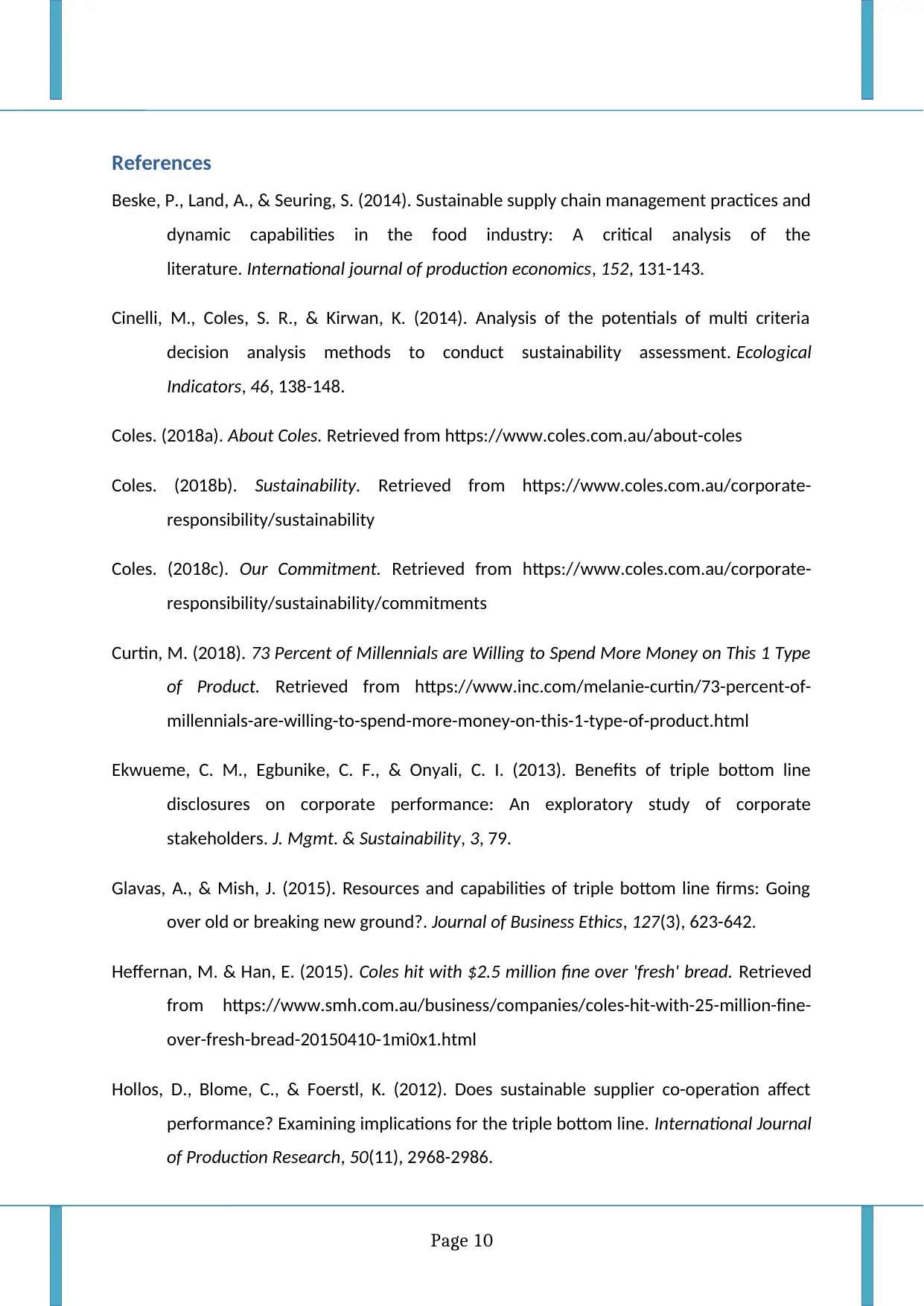
References
Beske, P., Land, A., & Seuring, S. (2014). Sustainable supply chain management practices and
dynamic capabilities in the food industry: A critical analysis of the
literature. International journal of production economics, 152, 131-143.
Cinelli, M., Coles, S. R., & Kirwan, K. (2014). Analysis of the potentials of multi criteria
decision analysis methods to conduct sustainability assessment. Ecological
Indicators, 46, 138-148.
Coles. (2018a). About Coles. Retrieved from https://www.coles.com.au/about-coles
Coles. (2018b). Sustainability. Retrieved from https://www.coles.com.au/corporate-
responsibility/sustainability
Coles. (2018c). Our Commitment. Retrieved from https://www.coles.com.au/corporate-
responsibility/sustainability/commitments
Curtin, M. (2018). 73 Percent of Millennials are Willing to Spend More Money on This 1 Type
of Product. Retrieved from https://www.inc.com/melanie-curtin/73-percent-of-
millennials-are-willing-to-spend-more-money-on-this-1-type-of-product.html
Ekwueme, C. M., Egbunike, C. F., & Onyali, C. I. (2013). Benefits of triple bottom line
disclosures on corporate performance: An exploratory study of corporate
stakeholders. J. Mgmt. & Sustainability, 3, 79.
Glavas, A., & Mish, J. (2015). Resources and capabilities of triple bottom line firms: Going
over old or breaking new ground?. Journal of Business Ethics, 127(3), 623-642.
Heffernan, M. & Han, E. (2015). Coles hit with $2.5 million fine over 'fresh' bread. Retrieved
from https://www.smh.com.au/business/companies/coles-hit-with-25-million-fine-
over-fresh-bread-20150410-1mi0x1.html
Hollos, D., Blome, C., & Foerstl, K. (2012). Does sustainable supplier co-operation affect
performance? Examining implications for the triple bottom line. International Journal
of Production Research, 50(11), 2968-2986.
Page 10
Beske, P., Land, A., & Seuring, S. (2014). Sustainable supply chain management practices and
dynamic capabilities in the food industry: A critical analysis of the
literature. International journal of production economics, 152, 131-143.
Cinelli, M., Coles, S. R., & Kirwan, K. (2014). Analysis of the potentials of multi criteria
decision analysis methods to conduct sustainability assessment. Ecological
Indicators, 46, 138-148.
Coles. (2018a). About Coles. Retrieved from https://www.coles.com.au/about-coles
Coles. (2018b). Sustainability. Retrieved from https://www.coles.com.au/corporate-
responsibility/sustainability
Coles. (2018c). Our Commitment. Retrieved from https://www.coles.com.au/corporate-
responsibility/sustainability/commitments
Curtin, M. (2018). 73 Percent of Millennials are Willing to Spend More Money on This 1 Type
of Product. Retrieved from https://www.inc.com/melanie-curtin/73-percent-of-
millennials-are-willing-to-spend-more-money-on-this-1-type-of-product.html
Ekwueme, C. M., Egbunike, C. F., & Onyali, C. I. (2013). Benefits of triple bottom line
disclosures on corporate performance: An exploratory study of corporate
stakeholders. J. Mgmt. & Sustainability, 3, 79.
Glavas, A., & Mish, J. (2015). Resources and capabilities of triple bottom line firms: Going
over old or breaking new ground?. Journal of Business Ethics, 127(3), 623-642.
Heffernan, M. & Han, E. (2015). Coles hit with $2.5 million fine over 'fresh' bread. Retrieved
from https://www.smh.com.au/business/companies/coles-hit-with-25-million-fine-
over-fresh-bread-20150410-1mi0x1.html
Hollos, D., Blome, C., & Foerstl, K. (2012). Does sustainable supplier co-operation affect
performance? Examining implications for the triple bottom line. International Journal
of Production Research, 50(11), 2968-2986.
Page 10
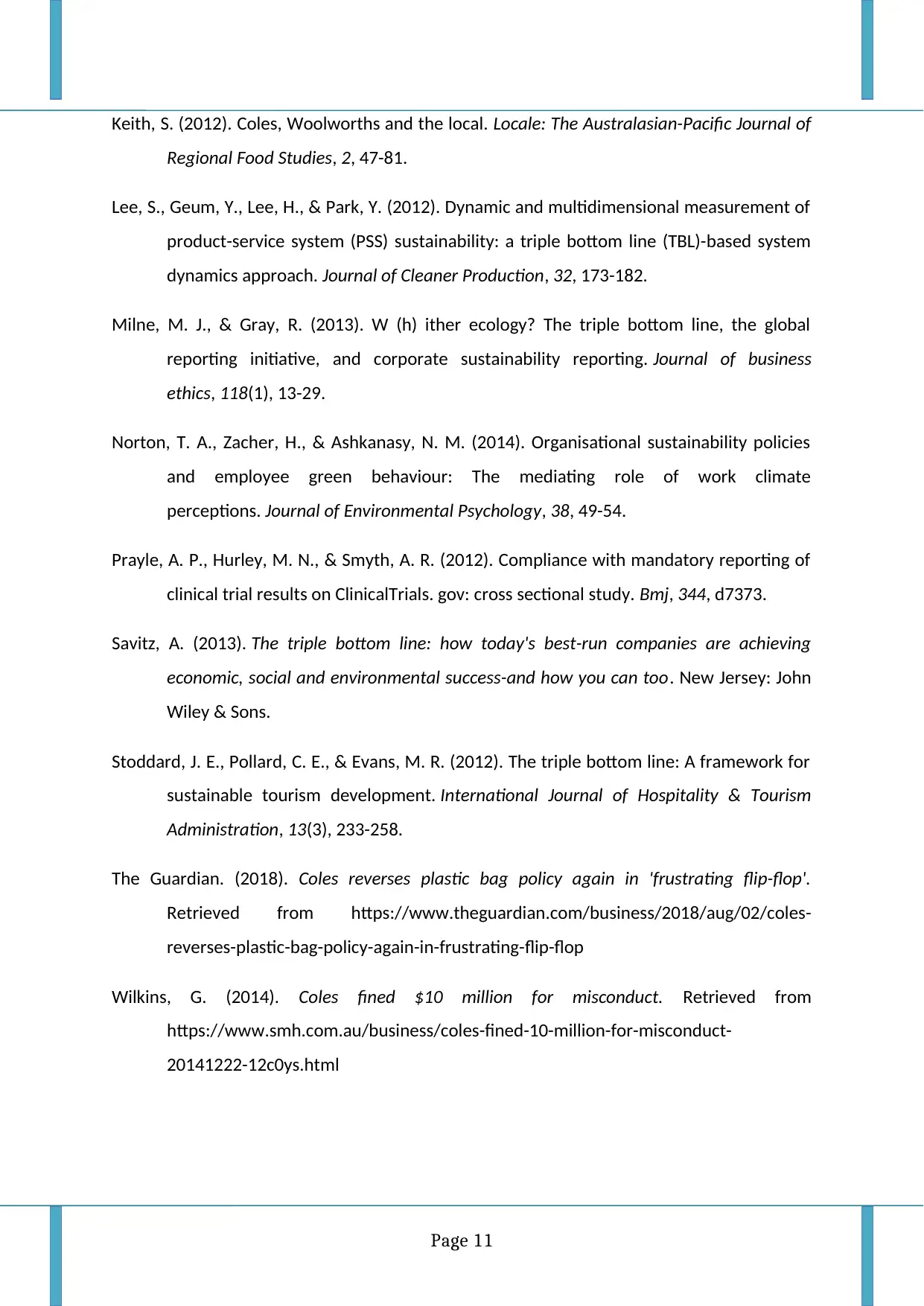
Keith, S. (2012). Coles, Woolworths and the local. Locale: The Australasian-Pacific Journal of
Regional Food Studies, 2, 47-81.
Lee, S., Geum, Y., Lee, H., & Park, Y. (2012). Dynamic and multidimensional measurement of
product-service system (PSS) sustainability: a triple bottom line (TBL)-based system
dynamics approach. Journal of Cleaner Production, 32, 173-182.
Milne, M. J., & Gray, R. (2013). W (h) ither ecology? The triple bottom line, the global
reporting initiative, and corporate sustainability reporting. Journal of business
ethics, 118(1), 13-29.
Norton, T. A., Zacher, H., & Ashkanasy, N. M. (2014). Organisational sustainability policies
and employee green behaviour: The mediating role of work climate
perceptions. Journal of Environmental Psychology, 38, 49-54.
Prayle, A. P., Hurley, M. N., & Smyth, A. R. (2012). Compliance with mandatory reporting of
clinical trial results on ClinicalTrials. gov: cross sectional study. Bmj, 344, d7373.
Savitz, A. (2013). The triple bottom line: how today's best-run companies are achieving
economic, social and environmental success-and how you can too. New Jersey: John
Wiley & Sons.
Stoddard, J. E., Pollard, C. E., & Evans, M. R. (2012). The triple bottom line: A framework for
sustainable tourism development. International Journal of Hospitality & Tourism
Administration, 13(3), 233-258.
The Guardian. (2018). Coles reverses plastic bag policy again in 'frustrating flip-flop'.
Retrieved from https://www.theguardian.com/business/2018/aug/02/coles-
reverses-plastic-bag-policy-again-in-frustrating-flip-flop
Wilkins, G. (2014). Coles fined $10 million for misconduct. Retrieved from
https://www.smh.com.au/business/coles-fined-10-million-for-misconduct-
20141222-12c0ys.html
Page 11
Regional Food Studies, 2, 47-81.
Lee, S., Geum, Y., Lee, H., & Park, Y. (2012). Dynamic and multidimensional measurement of
product-service system (PSS) sustainability: a triple bottom line (TBL)-based system
dynamics approach. Journal of Cleaner Production, 32, 173-182.
Milne, M. J., & Gray, R. (2013). W (h) ither ecology? The triple bottom line, the global
reporting initiative, and corporate sustainability reporting. Journal of business
ethics, 118(1), 13-29.
Norton, T. A., Zacher, H., & Ashkanasy, N. M. (2014). Organisational sustainability policies
and employee green behaviour: The mediating role of work climate
perceptions. Journal of Environmental Psychology, 38, 49-54.
Prayle, A. P., Hurley, M. N., & Smyth, A. R. (2012). Compliance with mandatory reporting of
clinical trial results on ClinicalTrials. gov: cross sectional study. Bmj, 344, d7373.
Savitz, A. (2013). The triple bottom line: how today's best-run companies are achieving
economic, social and environmental success-and how you can too. New Jersey: John
Wiley & Sons.
Stoddard, J. E., Pollard, C. E., & Evans, M. R. (2012). The triple bottom line: A framework for
sustainable tourism development. International Journal of Hospitality & Tourism
Administration, 13(3), 233-258.
The Guardian. (2018). Coles reverses plastic bag policy again in 'frustrating flip-flop'.
Retrieved from https://www.theguardian.com/business/2018/aug/02/coles-
reverses-plastic-bag-policy-again-in-frustrating-flip-flop
Wilkins, G. (2014). Coles fined $10 million for misconduct. Retrieved from
https://www.smh.com.au/business/coles-fined-10-million-for-misconduct-
20141222-12c0ys.html
Page 11
1 out of 12
Related Documents
Your All-in-One AI-Powered Toolkit for Academic Success.
+13062052269
info@desklib.com
Available 24*7 on WhatsApp / Email
![[object Object]](/_next/static/media/star-bottom.7253800d.svg)
Unlock your academic potential
© 2024 | Zucol Services PVT LTD | All rights reserved.





